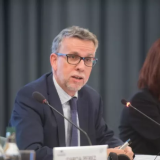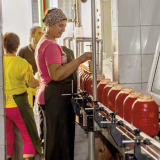
Συνθήκες εργασίας και βιώσιμη εργασία
Οι συνθήκες εργασίας και η βιώσιμη εργασία αποτελούν μία από τις έξι κύριες δραστηριότητες του προγράμματος εργασίας του Eurofound για την περίοδο 2021-2024. Το Eurofound θα συνεχίσει να λειτουργεί ως κέντρο εμπειρογνωμοσύνης για την παρακολούθηση και την ανάλυση των εξελίξεων στον τομέα αυτόν, συμπεριλαμβανομένου του τρόπου με τον οποίο η κρίση της νόσου COVID-19 έχει επηρεάσει τις συνθήκες εργασίας, την ποιότητα των θέσεων εργασίας και τις πρακτικές στον χώρο εργασίας.
Κατά την περίοδο 2021-2024, το Eurofound θα παράσχει σημαντικές πληροφορίες σχετικά με τις προκλήσεις και τις προοπτικές που σχετίζονται με τις συνθήκες εργασίας και τη βιώσιμη εργασία στην ΕΕ. Με βάση την μακρόχρονη εμπειρογνωμοσύνη στον τομέα αυτόν, το Eurofound θα εξετάσει τις τάσεις και την πρόοδο που σημειώνεται σε βάθος χρόνου και θα εντοπίσει τις αναδυόμενες ανησυχίες σχετικά με τις συνθήκες εργασίας και την ποιότητα των θέσεων εργασίας. Η ανάλυση θα καλύπτει διάφορες χώρες, τομείς, επαγγέλματα και ομάδες εργαζομένων σε θέματα όπως η οργάνωση της εργασίας και η τηλεργασία, ο χρόνος εργασίας , η ισορροπία μεταξύ επαγγελματικής και προσωπικής ζωής , η ίση μεταχείριση , η υγεία και η ευημερία στον χώρο εργασίας , οι δεξιότητες και η κατάρτιση , οι αποδοχές και οι προοπτικές καθώς και η ικανοποίηση από την εργασία. Ιδιαίτερη έμφαση θα δοθεί στις άτυπες μορφές απασχόλησης , και κυρίως στην αυτοαπασχόληση.
Υπό το πρίσμα της δημογραφικής πρόκλησης της ΕΕ λόγω της γήρανσης του πληθυσμού και της αυξανόμενης ποικιλομορφίας της επαγγελματικής ζωής, το Eurofound θα συνεχίσει να διερευνά τους παράγοντες που μπορούν να προσφέρουν σε περισσότερους εργαζομένους τη δυνατότητα να συνεχίσουν να εργάζονται για μεγαλύτερο χρονικό διάστημα. Επιπλέον, θα δώσει έμφαση στη βελτίωση της ποιότητας των θέσεων εργασίας ως καταλύτη για μεγαλύτερη συμμετοχή στην αγορά εργασίας και αύξηση των κινήτρων των απασχολούμενων, συμβάλλοντας στη βιώσιμη εργασία καθ’ όλη τη διάρκεια του βίου.
Οι σχέσεις μεταξύ εργασίας και υγείας θα διερευνηθούν σε στενή συνεργασία με τον Ευρωπαϊκό Οργανισμό για την Ασφάλεια και την Υγεία στην Εργασία (EU-OSHA). Στόχος του Eurofound είναι να αξιοποιήσει τη συνεργασία του με τη Διεθνή Οργάνωση Εργασίας (ΔΟΕ) σε θέματα σχετικά με το μέλλον της εργασίας και τις συνθήκες εργασίας σε παγκόσμιο επίπεδο.
- Εικονογράφημα: Συνθήκες εργασίας και βιώσιμες θέσεις εργασίας στην ΕΕ
«Γενικά, τα νέα είναι καλά, διότι οι συνθήκες εργασίας στην Ευρωπαϊκή Ένωση βελτιώνονται — αν και με αργούς ρυθμούς — το ανησυχητικό ωστόσο, είναι, ότι κάτι τέτοιο δεν ισχύει κατ’ ανάγκη για όλες τις ομάδες των εργαζομένων. Εξαρτάται σε μεγάλο βαθμό από τον τομέα στον οποίο εργάζεστε, από το μορφωτικό επίπεδο και, για να είμαι ειλικρινής, και από το αν είστε άνδρας ή γυναίκα.»
Barbara Gerstenberger, Προϊσταμένη της Μονάδας Επαγγελματικού Βίου



























